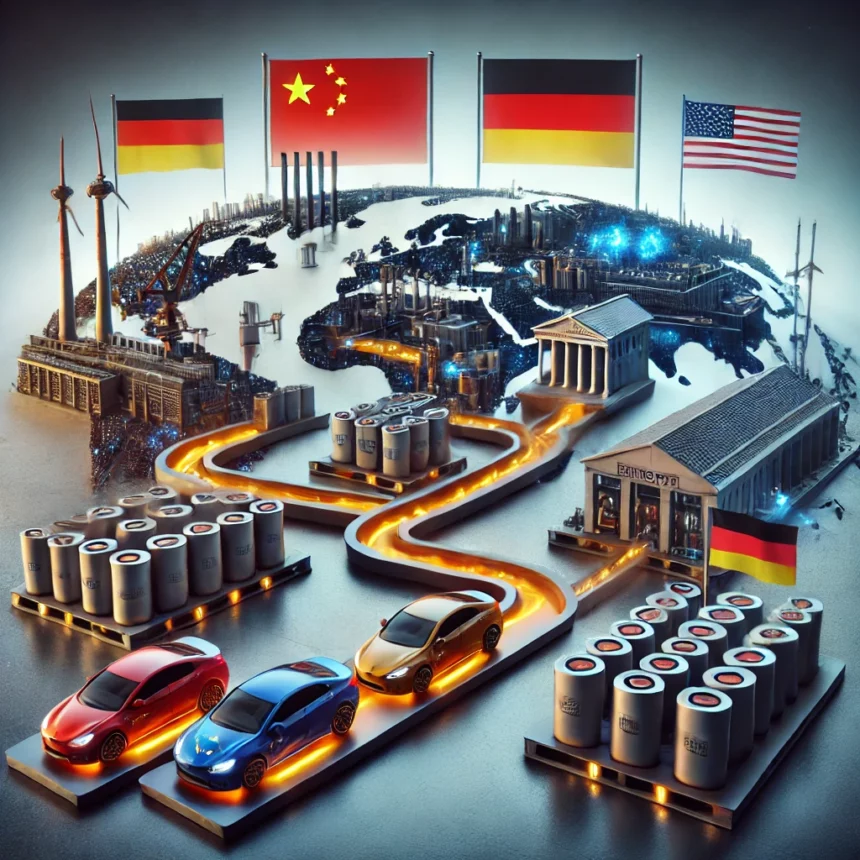This policy brief delves deeply into the repercussions of China’s monopoly on the electric vehicle (EV) market, examining the ways in which this expansion has been facilitated by state assistance and industrial policies, which have enabled Chinese EV manufacturers to rapidly expand their operations. Businesses like BYD have not only surpassed their foreign competitors in terms of sales, but they are also establishing themselves as market leaders in international exports. As a consequence of this increase, traditional leaders in the automotive industry, including Germany, are experiencing significant anxiety. Volkswagen and other organizations are encountering challenges in maintaining their market positions in China.
The automotive industry in Germany, which is a substantial contributor to the European economy, is particularly vulnerable to risk. Despite Germany’s long-standing leadership in the internal combustion engine market, the country is currently facing new obstacles as the electric vehicle sector transitions from traditional manufacturing to battery production, an area in which Chinese companies are currently leading. Due to its dominance in the battery supply chain, China enjoys a substantial competitive advantage. The cost of an electric vehicle is approximately forty percent attributed to batteries. There have even been discussions about the closure of Volkswagen manufacturing in Germany due to the country’s tardiness in adapting to this new reality. This development is potentially hazardous to the country’s economy.
The study compares and contrasts the perspectives of the United States of America and Europe regarding this novel terrain. The United States government has implemented protectionism by employing the Inflation Reduction Act (IRA) to promote the production of electric vehicles in the United States and to restrict China’s market access in North America. Furthermore, the United States has implemented tariffs on electric vehicles and batteries produced in China that can reach as high as one hundred percent, effectively eliminating them from the market. However, the European Union has been more amenable to Chinese investment, particularly in the field of battery manufacturing; however, this approach is not without its associated risks. Despite the potential to enhance the capacity of local manufacturing, the fact that Chinese businesses are already making substantial investments in European initiatives also raises concerns regarding the security of data and the extent of economic dependence.
The author of the article asserts that Germany must exercise prudence when negotiating this intricate situation. Therefore, it is imperative for China to allocate resources toward the advancement of its electric vehicle (EV) infrastructure. On the other hand, it is imperative that China ensures that these investments do not increase its economic dependence on China or expose the country to any security risks. The article proposes that Germany should advocate for more stringent regulations within the European Union to ensure that Chinese investments are in compliance with European security requirements and interests.. This entails leveraging the European market’s appeal to negotiate more favourable terms with Chinese enterprises and advocating for a unified European Union stance on trade policies and tariffs to prevent being divided by China’s economic influence.
In addition, the brief underscores the ethical and environmental implications of the competition. In order to facilitate the transition to a more environmentally friendly economy, Europe is required to guarantee that the electric vehicles and batteries it imports or produces adhere to rigorous environmental, social, and governance standards. The substantial carbon footprint of the electric vehicle development in China has been the subject of criticism, particularly due to the extensive use of coal in the battery construction process. Furthermore, European legislators are confronted with ethical dilemmas as a consequence of human rights concerns, particularly those that pertain to forced labour in regions like Xinjiang, where a substantial portion of China’s aluminium production is concentrated. The implementation of more stringent environmental, social, and governance (ESG) requirements has the potential to provide Europe with a competitive advantage while concurrently achieving its climate and human rights objectives.
It concludes by emphasizing that the worldwide transition to electric vehicles is both a problem and an opportunity for Germany and Europe. If they are capable of effectively managing the geopolitical, economic, and environmental complications, they may preserve their competitive edge in the global automobile industry. In order to achieve this, however, it is necessary to make strategic investments, take decisive action, and demonstrate a strong dedication to both ethical and security standards in the manufacturing and trade sectors.
Read the full article here: DGAP Policy Brief_No-17_September-2024_12pp_0







